#les cordeliers
Text
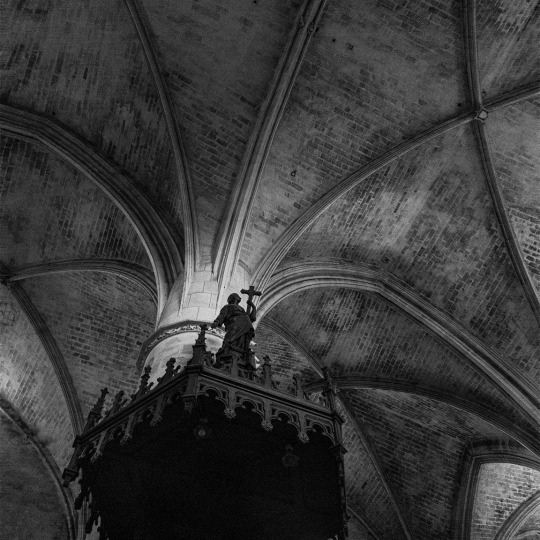
vault and statue,
Les Cordeliers, Saint-Emilion, France.
#les cordeliers#saint-emilion#france#interior#vaults#statue#photographers on tumblr#original photography#monochromatic#historic#frank foster
62 notes
·
View notes
Text
”elevated horror” this and that. you’ll never be Utterson looking at his best friend’s lifeless body with a mixture of sorrow and relief and sighing “Justice has been made” out of breath, voice cracking, eyes heavy .at the end of Le Testament Du Docteur Cordelier
#jekyll and hyde#the strange case of dr jekyll and mr hyde#dr jekyll and mr hyde#le testament du docteur cordelier
64 notes
·
View notes
Text
all the talk about how utterson might have reacted to reading lanyon and jekyll’s letters got me Thinking once again about le testament du docteur cordelier (jean renoir's unauthorized, but surprisingly faithful, 1959 adaptation), where utterson/joly finds hyde/opale still alive and hears his confession. so we get to see this man, who has never lost his cool and gentleness once during the movie, just rage and deny and accuse and rationalize until he can't anymore and he simply loses it. and then we get to see him look at hyde dead in the eyes, disgusted and unforgiving but still calling him "jekyll, my friend".
(and hyde’s reaction to all this is saying “the hurt caused by your anger gives me hope”...)
#not enough people have seen this adaptation must i alone be burdened with the knowledge of joly and cordelier#and all the other things renoir got right#jekyll and hyde weekly#jekyll and hyde#le testament du docteur cordelier#by me#gabriel utterson#henry jekyll#edward hyde
187 notes
·
View notes
Text
I KEEP FORGETTING TO POST THESE BOYS
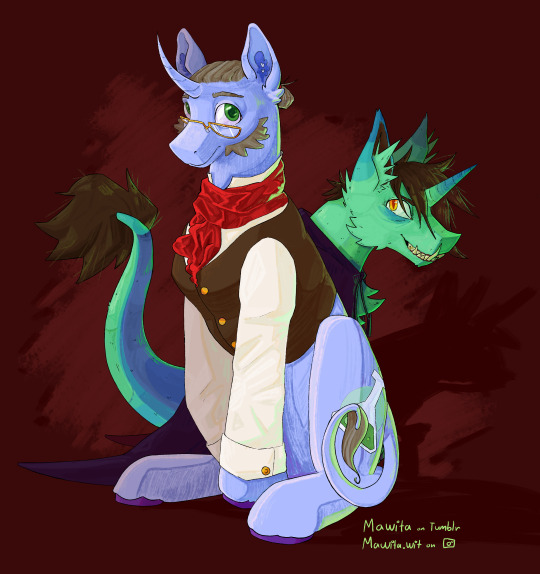
JEKYLL AND HYDE PONIES, AND YES, LORE EXISTS
Hyde on his own, and basically just a blog post with thoughts and process notes under the cut!
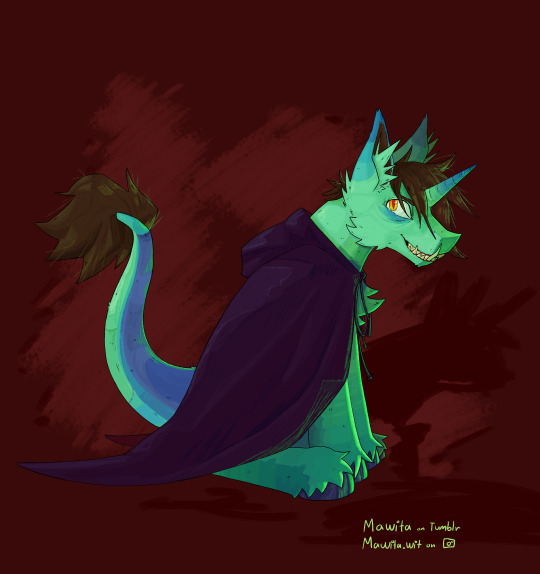
Personal Notes
Exams have been killing me, and i am, finally done!! Wooo!! Yeah, time for a break year, i hope I'll have more time for art :))
Anyways yeah, silly Jekyll and Hyde ponies, this is my biggest fixation here over the last year, its killing me, could genuinely turn into a special interest at this rate.
anyways, these two came about out of a want to illustrate book Jekyll and Hyde, but humans just, hurting me to draw atm, so ponies instead.
Design Notes
Shape! I wanted Jekyll to feel Big and Bombastic, fat Jekyll rights (although, I admit, I don't think I made him fat enough here, I'll out more effort into that in later pieces/sketches. I hope to develop their shape specifically a lot.) In contrast, of course as described in the book, Hyde is smaller, younger, and sharper. I gave him the teeth from the 1931 movie, cuz that's honestly the only part of that design I like apart from the flesh that starts to melt at the end of the movie (cough cough, racist charicature)
Colors! Admittedly a bunch of this was simply done because i thought it looked good. Jekyll feels inherently blue to me, and Hyde being toxic green just felt appropriate. But also, having them purely be cold would not be the most balanced pallete. I wanted to give them both warmth. Jekylls warmth comes from his Vest and Cravat, clothes he dons as an expression of his class and social standing. He cares a lot about his position in the upper crusts of London's society, and plays into his role with care. The colors on him that stand out the most, his warmth and his sociability, is performative in its expression. Hyde's only warmth is in his yellow-red eyes, from living an (exaggerated) version of his authentic self.
Cutie Mark! Potion bubbles mmmmmm :)). Important note tho! The cutie Mark DOES NOT CHANGE between the forms! Hyde is Jekyll! A truly fucked up Jekyll, a Jekyll most likely under the influence (in this au canon: definitely under an influence)
Also fun fact! These pony designs are based on my pony town designs of Jekyll and Hyde :3
Anyways yeah, when I've settled into my new apartment I'd like to explore these two buggers a bit more. Strangely enough, I believe the my little pony friendship is magic universe has some deep implications for the Jekyll and Hyde story, that I am very grasped by.
That ends it for this post, if you got this far, thank you for indulging me!!
#Also reminder: Jekyll does NOT have DID#Hyde does NOT represent OCD or Intrusive thoughts#Le Testamente du Docteur Cordelier is one of the greatest adaptations ever#Dr Jekyll and Sister Hyde is hilarious and I love it#Aaaaaaaaaand hit send#Jekyll and Hyde#Dr Jekyll and Mr Hyde#Jekyll#Hyde#the strange case of dr jekyll and mr hyde#my little pony#mlp#oc#oc art
46 notes
·
View notes
Text
Ô ! mon vieux camarade de collége, toi dont la postérité relira les discours éloquens, souviens-toi de ces leçons de l’histoire et de la philosophie : que l’amour est plus fort, plus durable que la crainte ; que l’admiration et la religion naquirent des bienfaits ; que les actes de clémence sont l’échelle du mensonge, comme nous disoit Tertullien, par lesquelles les membres des comités de salut public se sont élevés jusqu’au ciel, et qu’on n’y monta jamais sur des marches ensanglantées.
― Camille Desmoulins, Le Vieux Cordelier, n°4
It is one of my favorite passages in writings of the birthday boy. Happy Birthday Camille!
#I also like his last letter but it always makes me too sad#Sorry I can't take the time to translate it into English#camille desmoulins#Le Vieux Cordelier
12 notes
·
View notes
Text


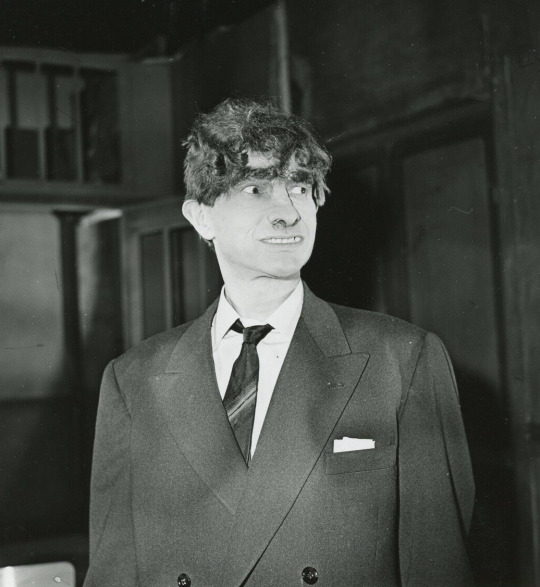

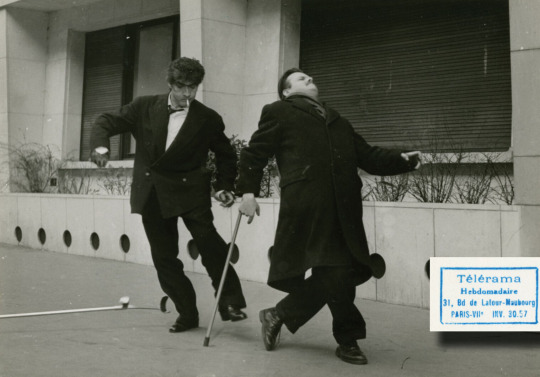
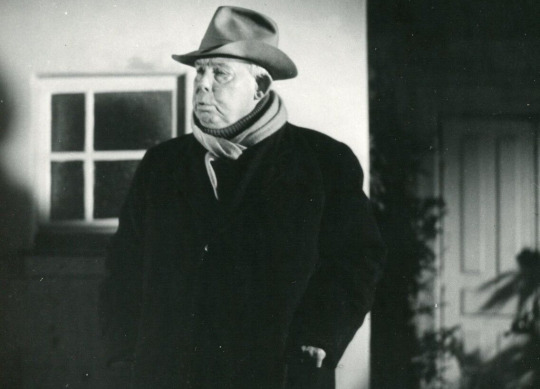
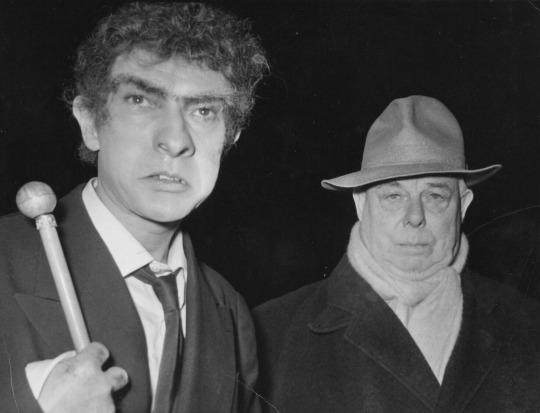

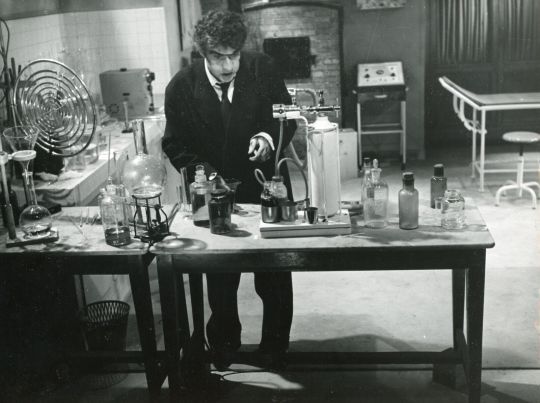

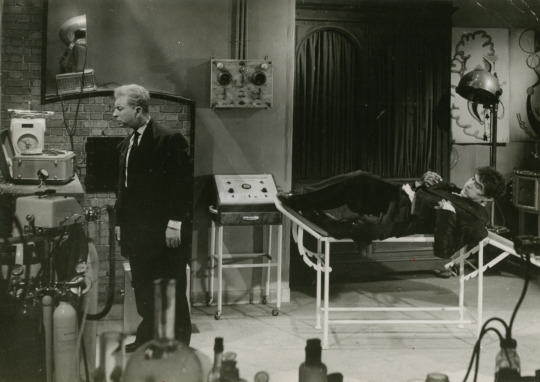
Le testament du Docteur Cordelier (1959)
AKA Experiment in Evil; The Doctor's Horrible Experiment
#le testament du docteur cordelier#experiment in evil#jean louis barrault#teddy bilis#sylviane margollé#jean bertho#1958#1950s movies#jean renoir#tv movie#jekyll and hyde#horror movie poster
34 notes
·
View notes
Text

I made this for @hydepotions
#le testament du dr cordelier#experiment in evil (1959)#the strange case of dr jekyll and mr hyde#jekyll and hyde#dr jekyll and mr hyde
36 notes
·
View notes
Text
She 'Le Testament du Docteur Cordelier' (1959) on my 'Amnesia: The Bunker' until I "It is very difficult to pinpoint the exact beginning of a tragedy. The tragedy has often taken root in the lives of the victims before they have even suspected its existence."
#honestly this is just kind of all the amnesia games but shhhh#what do i even tag this as#le testament du docteur cordelier#amnesia the bunker#french people idk
9 notes
·
View notes
Text
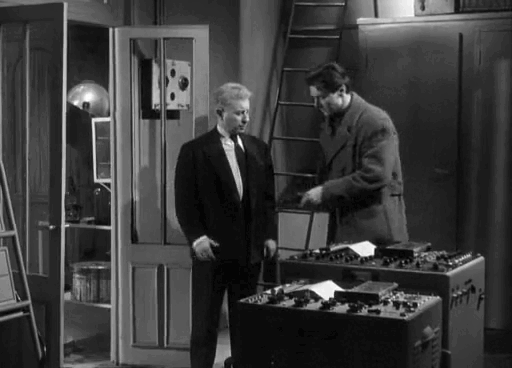
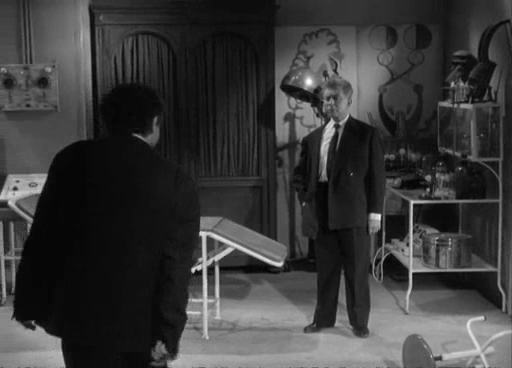
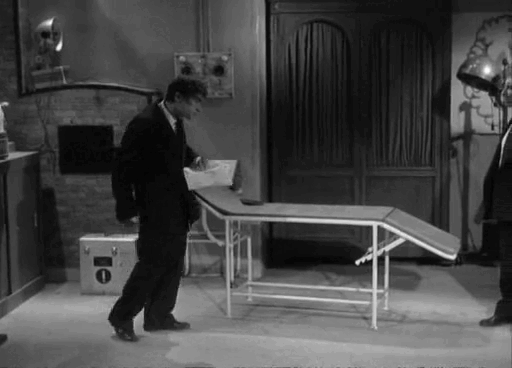
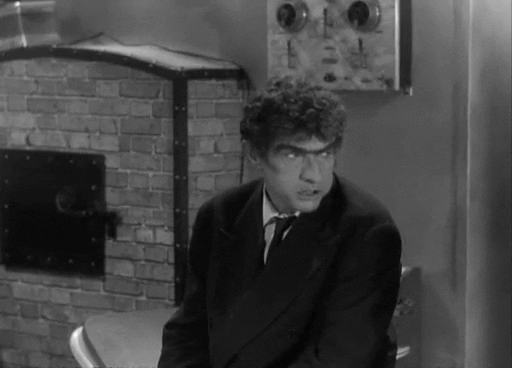
[ID: A gifset featuring Mr Opale / Mr Hyde and Mr Joly / Mr Utterson from Le Testament du Docteur Cordelier (1959):
A servant of Jekyll hands a pistol to Utterson before leaving him alone with Hyde. Hyde gestures to his own pocket, telling Utterson to put away his gun, and Utterson complies and does so.
Hyde walks up to Utterson with the key to the locked lab door. He holds it out to Utterson, playfully waves it around when he hesitates to take it, and then Utterson snatches it from him in annoyance.
Hyde fetches a packet and walks back over to Utterson, tossing it to him onto the lab bed, and then sitting down and kicking his legs as he waits for Utterson to take it.
Hyde gestures with his head to the packet, urging Utterson to open it. With his permission, Utterson begins to try to open it with his hands. Hyde casually tosses him a letter opener, and Utterson flinches and pulls back reflexively. Then he takes the letter opener and opens the packet. End ID]
#the strange case of dr jekyll and mr hyde#hydeseek#dr jekyll and mr hyde#le testament du docteur cordelier#the testament of doctor cordelier#the doctor's horrible experiment#their dynamic is so fun#Hyde is Jekyll so he's so trusting and at ease#and Utterson doesn't know that yet so he's cautious#in Hyde's mind he's hanging out with an old friend#and in Utterson's mind he's negotiating a hostage situation with a murderer
13 notes
·
View notes
Text
Young green-eyed man loses his virginity in 1789, replies to his partner's disbelief like

"So what! Everyone has their own priorities! Have you read Rousseau's complete work?"
Surprisingly, it's not Robespierre
26 notes
·
View notes
Text

1 note
·
View note
Text
If I had a nickel for each surprisingly accurate jekyll and hyde adaptation set in a time other than the Victorian era that depicts Jekyll as a morally messed up psychiatrist with emotional baggage and a complex, deep friendship with Utterson, I’d have two nickels. Which isn’t much but I love that it’s happened twice
60 notes
·
View notes
Text
Analysis of the French Revolution film by Robert Enrico and Richard T. Heffron
One of the (many) problems with films about the French Revolution is that in 1989, anyone wanting to make films about this period was required to adhere to the government's line, which dictated that the revolution could only be portrayed as leading to horrors, under threat of censorship. We can see this in the struggles Hervé Pernot faced. Even during de Gaulle's time, filmmakers who tried to make films as honest as possible about the revolution faced obstacles. Thus, there are inevitably significant historical inaccuracies in these films. Ironically, the leader of the country at the time of this cinematography, Mitterrand, who endorsed such thinking, had guillotined many Algerian revolutionaries, including some who never intended to harm anyone, like Fernand Iveton, or Algerians who were falsely accused. He endorsed parody trials of Algerians, far more significant and flagrant than those of 1794 regarding the Hebertists, Enraged, and Indulgents, when he was Minister of Justice in 1957, solely to please colonialist lobbying and secure a good political position. Therefore, he has no moral ground to lecture the Montagnards, who only abandoned their restraint once France's position was untenable both internally and externally. Most of them, along with other non-Montagnard members, courageously sided with the colonized.
I'll try to avoid delving too much into the absurd black legends unless it's unavoidable, such as when the film seems to endorse Brissot's statement that the "Revolutionary Tribunal is the Spanish Inquisition a hundred times worse." I know the Revolutionary Tribunal committed unforgivable acts in some of its parodies of justice, but the stupidity of this statement speaks for itself.
In the film, the "good guys" are Danton, Lafayette, and Mirabeau. It doesn't matter that they were all corrupt to the core, although Danton should not necessarily be lumped in with Mirabeau, as Danton may have accepted bribes but didn't necessarily fulfill his end of the bargain, and Lafayette, in my opinion, demonstrated more bloodthirstiness. Marat is depicted merely as a madman instead of showing that he was a man ahead of his time, an honest revolutionnary and brillant, sometimes , used inappropriate language due to the injustices he and the people faced. There's an interesting parallel here with the Algerian revolutionary Abane Ramdane, who shares many similarities on these points for me. Instead, we attribute this talent to Danton and potentially Desmoulins.
In the film, the French revolutionaries are portrayed as defeated, but victory is ultimately achieved, solely credited to Danton, which is false, reductionist, and even insulting to all revolutions. If revolutions succeed, it's certainly partly due to intellectual leaders, including figures like Saint Just, Le Bas, Lindet, Charlier, Billaud Varennes, Robespierre, and Hanriot, but it's primarily thanks to the people who supported them—the soldiers who held the line, the sans-culottes who persuaded the Convention to enact or repeal certain laws necessary to sustain the revolution, and the people who endured necessary but harsh taxes, who gave their shoes, sheltered revolutionaries—something most revolutionaries acknowledge.
The film reduces the Hebertists, Enrages, and Cordeliers to madmen united behind Hebert, portraying them without charisma, failing to show why they were popular, and omitting the split between Chaumette and the rest because Chaumette refused to join the insurrection against the Mountain after the Ventôse law.
On the other hand, during Danton's trial, the indulgents are cheered by the people. I know Danton delivered excellent speeches during his trial, but so did other factions, and there's no evidence of this particular scene. I've already discussed the differential treatment between indulgents, Hebertists, and Cordeliers in one of my previous posts. Apart from Hebert, virtually all Hebertists were executed with great dignity.
Marie Antoinette, to better exonerate Louis XVI, is portrayed as helpless during the trial, appearing scared before the scaffold. In reality, she showed courage and dignity that even her adversaries admired, which isn't depicted because she might come across better than Danton.
The Girondins sing the Marseillaise as they mount the scaffold. Regardless of whether one likes them or not, they showed great courage, which isn't shown because they might come across better than Danton on the scaffold.
Lucile Desmoulins and Marie Françoise Goupil, along with Chaumette, Gobel, and others, die with great dignity, but this isn't shown either. For Danton glorification the is the only except Louis XVI to face his death in dignity.
Robespierre is depicted as a coward fleeing his arrest with Saint Just and Couthon, whereas in reality, the gendarmes didn't want to arrest him, and he willingly offered his hands for arrest. The uprising of 17 out of 49 communes was spontaneous, but most revolutionaries hesitated because they didn't know whether to remain lawful or not, resulting in their losses (a Napoleon would have fewer scruples than them and for the wrong reasons) . Again because it will make them better than Danton ( let' s not talk about the glorification of Barras in this scene).
Morality: Only corrupt men act. The most selfless are depicted as grave fanatics who will execute you. It's no wonder the government approves of such films promoting these messages.
Not to mention the women erased from the revolutionary period—Manon Roland, Lucile Desmoulins portrayed as gentle without the political acumen of the real Lucile Desmoulins. Similarly tratment for Simone. Evrard Eleonore Duplay is depicted as personality-less fanatic , far from the real Eleonore Duplay. Louis Reine Audu, Pauline Léon, Olympe de Gouges, Marie Anne Babeuf, Albertine Marat, Charlotte Robespierre, and Elisabeth Le Bas, among many others, will not be shown.
I might write a second part soon if I have the time or in one month for a better analysis of the characters.
32 notes
·
View notes
Text
Masterlist of Resources
Very much a work in progress, please be patient <3
table of contents for my own resources (posts, translations, etc.) and suggested readings from experts and people in the frevblr community.
Saint-Just:
Convention Speeches: (with partial English translations)
First Speech: 13 November 1792 on the debate of putting the King to trial.
19 vendémiaire an II (10 October 1793)
9 Thermidor an II (28 July 1794)
"Praise the Victories and Forget Ourselves" Excerpt
"Tarpeian Rock" Analogy from 9 Thermidor Speech draft
Misc:
Why I study SJ
My Thoughts on SJ's Thoughts on the Terror
SJ's Paris Apartment ( w/ @/ vieillesmaisons)
SJ's various lodgings
Speech to Army of the Rhine excerpt
Alsace Mission Map
Linton on SJ as the face of "the Terror"
Saint-Just on Marat
SJ Handwriting example deciphered
Arlequin-Diogene (SJ's play) [working on a translation]
What inspired the nature elements of Organt
Saint-Just: Apostle of the Terror by Geoffrey Bruun (my personal favorite English SJ bio)
Bio Recs
Marat:
general resources
L' Ami du Peuple Archive (all issues presumed)
PS- Head over to @dailymaratmail for daily L'Ami du Peuple and other Marat writing excerpts (in collaboration with @/viellesmaisons and @/lamarseillasie
Robespierre:
Bio recs
Robespierre's silly snot poem
Why are there Anti-Robespierrests?
Misc.:
My Carnavalet photos, SJ Bust , Marat Bathtub, Cordeliers monastary, Marat Printer, Panthèon National Convention Sculpture, Robespierre Bust.
On Brissot
On Lafayette
School of Mars, (see Barère, Le Bas)
Camille Desmoulins' letter to his father (1789)
Frevolutionaries' symbols on rural calendar
Anecdotes
Most important basic info [coming soon]
131 notes
·
View notes
Text
[After the arrest of Danton and Desmoulins] Lucile ran to Madame Danton to suggest that she come with her to go find Robespierre, ask him for an explanation, and recall the feelings of friendship which had attached him to their husbands. Madame Danton refused, saying that she wanted nothing from a man who had showed himself to be the enemy of her husband. (I obtained this particularity from Madame Danton herself, who was then pregnant. She gave birth fifteen days after Danton's death, but her child did not live.)
Histoire de la Révolution française (1850) by Nicolas Villiaumé, volume 4, page 55. This ties in well with the following anecdote that was first reported by Marcellin Matton (who presumably obtained it from Lucile’s mother Annette Duplessis) in his republished edition of Le Vieux Cordelier (1834):
Camille, the day after his arrest, wrote a letter to his wife to console her. One of Camille’s friends took it to Lucile: she read it while sobbing, and as he tried to console her: “It's useless,” she said, “I cry like a woman, because Camille. suffers, because without doubt they let him lack everything; because he does not see us.... But I will have the courage of a man, I will save him.... What to do? which of his judges must I supplicate? Which one should I attack openly? Would you like to take me to Philippeaux?”
”He has also been arrested, no doubt.”
”So the homeland no longer has defenders.... I am going to see Danton....”
”The same decree unites him to your husband.”
”Why have they left me free? Do they think that since I’m only a woman I won’t dare to raise my voice? Have they counted on my silence? I’m going to the Jacobins… I’m going to Robespierre’s house…”
Madame Duplessis and Camille's friend restrained her and urged her not to take any inconsiderate steps that could lose her and her husband as well; finally she agreed to remain quiet; but she wanted to write to Robespierre to ask him to save her husband, the letter remained unfinished and was never sent.
#lucile desmoulins#louise sebastienne danton#georges danton#camille desmoulins#robespierre#maximilien robespierre#frev#french revolution#danton did have sex with a 17 year old then… that’s gross#but poor louise#first she has to deal with her husband’s demise and then she gives birth for the first time ever just two weeks later#only to have the baby die as well
18 notes
·
View notes
Text
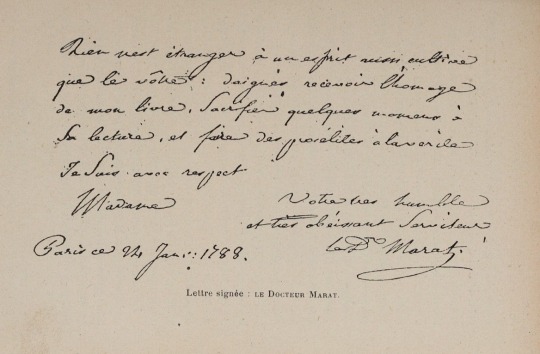

Two letters signed "Docteur Marat".
The first one, dated January 24, 1788, possibly refers to the Mémoires academiques. It was published by ML. Noël Charavay in the January 1st issue of La Chronique médicale, 1904 (p. 27):
"Madame,
Nothing is foreign to a mind as cultured as yours: deign to receive the homage of my book, sacrifice a few moments to its reading, and proselytize the truth. I respectfully remain, Madame, your most humble and obedient servant.
Dr. Marat.
Paris, January 24th 1788."
The second letter, addressed to M. Méquignon and dated February 28, 1792, may have been the last letter in which Marat signed only "Docteur Marat". It was also communicated by Charavay. You can find it on pp. 223-224 of Marat's correspondence, collected by Charles Vellay:
"To Monsieur Méquignon l'ainé, rue des Cordeliers.
My compliments to Mr. Méquignon
It [has] been nearly three years since I settled an account with him. On the books I have given him to sell on my behalf, in return for the agreed discount, I ask him to kindly give Mr Feveaux, the bearer of this bill, the bill and the amount of the articles sold, as well as the acknowledgement of the articles that remain unsold. The bearer is authorized to give receipt in my name. This bill will serve as a guarantee.
Le Dr. Marat.
Paris, february 28th, 1792."
#le docteur marat#translations may be subject to errors!#marat#marat's correspondance#letters#jean paul marat#my posts
37 notes
·
View notes